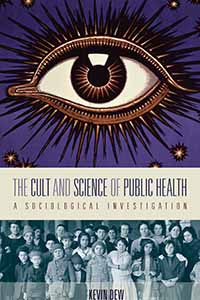 From Idea to Book is an occasional series in which Berghahn authors discuss the origins of their work. Here, Kevin Dew describes how a discussion with a student about Durkheim planted the seed that would eventually become The Cult and Science of Public Health: A Sociological Investigation, which was published by Berghahn this spring.
From Idea to Book is an occasional series in which Berghahn authors discuss the origins of their work. Here, Kevin Dew describes how a discussion with a student about Durkheim planted the seed that would eventually become The Cult and Science of Public Health: A Sociological Investigation, which was published by Berghahn this spring.
The impetus to write my book developed over a long period of time, but there were occasions that particularly focused my thinking. A pivotal moment was a discussion I had with a PhD student when I was a lecturer in a Department of Public Health at a medical school. She was using the work of Emile Durkheim to consider the role of neighbourhoods in relation to health. We were throwing around ideas about what sort of social factors foster solidarity or cohesion at a neighbourhood level, and we mentioned religion but moved on quickly as religion does not generally operate at a neighbourhood level. It was then that I had an ‘aha’ moment. Durkheim had argued that there would be a new form of religion in contemporary society that would act as a moral force enhancing social solidarity. There were a few important aspects of this new religion according to Durkheim, including the idea that it would have as its point of worship that which we all hold in common, our humanity. Another aspect was that this religion would be based on science but go beyond science. What could that new religion be?
I had what seemed like a moment of revelation or an epiphany. Here I was, working in a department of public health, surrounded by people committed to improving human health – that which we all hold in common. In doing so they were in battle with health-deleterious capitalist industries, such as tobacco, food and alcohol companies. In addition, health promotion activities were aimed at tempering the population’s consumption of fatty foods and tendencies to idleness. The moral dimensions of public health were suddenly very clear to me and I started to consider myself as being at the centre of this new religion that Durkheim predicted – this cult of humanity. Some things that had puzzled me started to make sense. For example, that public health positioned itself as a science with all it critical and sceptical faculties, but went beyond science in its advocacy activities when those critical faculties could be suspended in the pursuit of bringing about social change. I could now see this as the new religion being based in science – but moving beyond science. With these accumulating insights I decided I needed to explore this idea that public health functioned as a religion more systematically and thoroughly, and my book is an outcome of that exploration.
